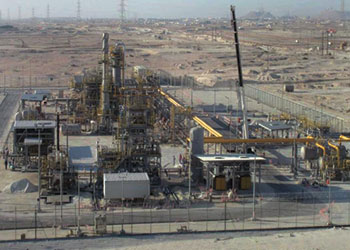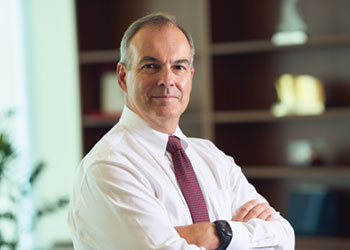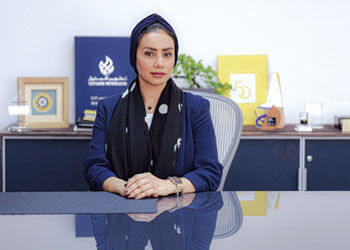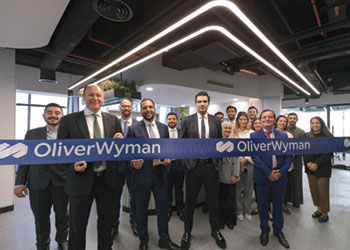
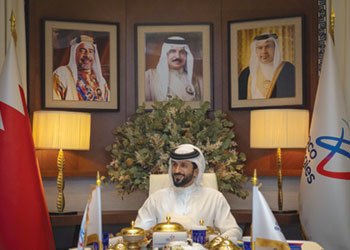 Shaikh Nasser ... boosting the Kingdom's energy resources
Shaikh Nasser ... boosting the Kingdom's energy resources
After unveiling its national energy strategy and launching a climate solutions fund, the Kingdom has stepped up commitment to achieve net-zero emissions by 2060
Bahrain is well on the road to net-zero and its fight against climate change with serious efforts, such as the launch of a $750 million climate technology fund and a new national action plan to achieve carbon neutrality and tackle climate change effectively.
Announced right before the start of the COP28 summit in Dubai in November, the fund was launched by Bahrain-based Investcorp, a global alternative investment manager, and is backed by the country’s sovereign wealth fund, Mumtalakat.
Called Climate Solutions Partners, it will be used to "accelerate the global transition to a zero-carbon economy with a focus on the deployment and rapid scaling of commercially proven climate solutions that have the potential to transform industries", the manager said on its website.
Investments in this regard will be done across four key impact pathways: Carbon management, buildings, transportation, and food and agriculture.
This was reiterated by His Majesty King Hamad of Bahrain in his speech at COP28, where he announced Blueprint Bahrain, a new national energy strategy, which will focus on three aspects: Moving to a low-carbon economy, adapting to climate change and creating sustainable opportunities.
NATIONAL ENERGY STRATEGY
Blueprint Bahrain is a reaffirmation of Bahrain’s commitment to the Paris Agreement, reducing emissions by 30 per cent by 2035 and reaching net-zero in 2060, as announced at the COP26 Glasgow Summit.
A BNA report said the plan, one of six priority sector strategies in the Kingdom’s Economic Recovery Plan, is rooted in the twin objectives of decarbonising Bahrain’s economy while ensuring reliable and affordable access to energy for its economic growth.
According to the strategy, Bahrain has opted for a partnership model, which will see collaboration between government and industry.
The strategy relies on three levers: optimising energy demand to reduce energy intensity and consumption, diversifying the country’s power mix to include cleaner energy sources, and deploying carbon abatement technologies to decarbonise hard-to-abate sectors.
Bahrain sees economic opportunity in its plan. Its size, location and favourable regulatory environment, make it uniquely positioned to serve as a regional hub for the development and testing of innovative clean technologies.
His Highness Shaikh Nasser bin Hamad Al Khalifa, Representative of His Majesty the King for Humanitarian Works and Youth Affairs, Chairman of Bapco Energies said: "Bahrain is embarking on a transformative journey towards a more sustainable future where energy security evolves as a shared responsibility, nurtured by the innovation of our domestic energy industry."
At COP28, the King also highlighted the Safa carbon offsetting platform, which was launched by Mumtalakat early December to help businesses and individuals better understand and manage their carbon footprint.
Mumtalakat said Safa shouldn’t be seen as an alternative to decarbonisation efforts but it is meant to create awareness and empowering action at the individual and corporate levels.
"With Safa, individuals and businesses have the ability to decrease their carbon footprint and actively participate in creating a more environment-friendly future, supporting the Kingdom of Bahrain's goal of reaching net zero emissions by 2060," Shaikh Abdulla bin Khalifa Al Khalifa, Mumtalakat CEO, said.
The platform will facilitate the transaction of high-quality and globally certified carbon credits through a partnership with CHOOOSE, a climate tech company that offers carbon emissions information and access to trusted climate solutions.
The King extended an invitation to top scientists and entrepreneurs to come to Bahrain to innovate in energy solutions.
Bapco Energies, the state-owned integrated energy company, is also not behind in driving energy transition in the country,
Mark Thomas, Bapco Energies CEO, said the national oil company’s operations were aligned with the Kingdom’s sustainability ambitions.
"This includes our Bapco Modernization Programme, which once completed, will be one of the most efficient, complex, and modern refineries within the region. In the past month, we have expanded our financing capabilities, proudly launching our Sustainability Linked Finance Framework in partnership with Standard Chartered Bank. In doing so, we became the first national oil company in the world to directly link financing to our decarbonization targets, encompassing Scope 3 emissions."
Bapco Energies will also be introducing three new ventures to maximise enterprise value through investments in cutting-edge technologies and renewable energy, demonstrating the numerous collaborative opportunities within Bahrain's flourishing energy sector.
BOOSTING ENERGY SUPPLIES
Bahrain is pushing to increase its oil and gas resources. In the beginning of 2023, Bahrain announced two unconventional natural gas discoveries in the Al-Joubah and Al-Jawf reservoirs, located under the existing onshore gas-producing fields of Al-Khuf and Al-Onaiza.
There are currently no updates on the finds.
In 2018, a mega discovery of, at least, 80 billion barrels was announced off the coast in the Khaleej al-Bahrain field.
In 2022, Thomas had told OGN energy magazine the field would be "uneconomic to develop using today's technology and approach", adding there were no plans, for 2022 or 2023, to do any further work offshore, at least, not in the Khaleej al-Bahrain field.
Separately, Bahrain aims to cut domestic natural gas consumption and use the saved fuel for exports to international markets.
Sheikh Nasser said the plan was to add solar as a source of energy into grid instead of just "wasting" gas.
He said some of the solar farms will be located in neighbouring Saudi Arabia and the UAE.
Bahrain produces around 2 billion cu ft feet per day of gas, most of which is used to generate power locally. It also produces around 190,000 barrels per day of oil at an onshore and an offshore field.
Furthermore, the Kingdom is studying the possibility of constructing a floating liquefied natural gas (LNG) facility to export gas in order to capture strong international demand.
In October, Thomas said Bapco Energies was considering raising cash selling its assets in the next six months.
"We could be making some announcements within the next six months on potential for some asset monetisation," Thomas told Reuters.
ALTERNATIVE ENERGY SOURCES
Bahrain aims to improve the total share of renewables in the energy mix to 5 per cent by 2025 and 20 per cent by 2035.
A BNA report quoted Kamal bin Ahmed Mohammed, President of the Electricity and Water Authority (EWA), as saying his authority was simplifying the process of integrating renewable energy resources to EWA’s electricity network.
EWA is coordinating with the Information and e-Government Authority (iGA) to digitise all stages of renewable energy applications through the unified portal, Benayat, and help accelerate the applications process.
Mohammed said 303 applications have been submitted for the installation of renewable energy from residential, commercial and industrial sectors, and 180 of these have been successfully commissioned and connected to EWA’s electricity distribution network.
The total connected capacity currently exceeds 38 MW, with over 150 MW expected to be installed by 2026.
By Abdulaziz Khattak







































































